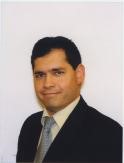Francisco Silva, MD, MPH, PhD

Francisco Silva, MD, MPH, PhD, is an assistant professor, Pontificia Universidad Catolica de Chile, Chile. Dr. Silva completed his VCRC Fellowship (2006-2008) at the Mayo Clinic, Rochester, with Ulrich Specks, MD, as his mentor. Dr. Silva is the director and founder of Vasculitis Unit, at Pontificia Universidad Catolica, Chile.
This interview with Dr. Silva was conducted by the Vasculitis Foundation in 2007.
I grew up in Santiago, Chile where I completed both my undergraduate and medical degrees at the Catholic University of Chile. I am married to Alejandra Araya who is a nurse and is completing her Ph.D. in nursing science at the University of Illinois in Chicago. I enjoy reading astronomy and observing the night sky. I have especially enjoyed seeing the constellations from the northern hemisphere.
I became interested in becoming a physician in high school where I had the opportunity to participate in a scientific group organized by the biology teacher. It was a fantastic period in which I discovered the wonderful world of the microscope, fossils and experiments. Since that time my interests in biology and the human body led me to medicine as the vocation that fulfills both.
Patients with vasculitis have fascinated me because of the complex nature of their disease manifestation. They are the type of patients you never forget. To improve their treatment and care, we need to answer many open questions about etiology, pathophysiology and their relationship to other autoimmune diseases.
My interest in vasculitis was sparked by one most memorable patient I took care of during my early days of training. She was a delightful woman in a public hospital in Chile who presented with skin ulcers on her legs. This woman had histologically confirmed microscopic polyangiitis and a positive P-ANCA. What initially seemed to be a minor ulcer progressed rapidly to compromise the entire foot, and new ulcers appeared on her upper extremities. She also developed renal insufficiency. I was impressed that a disease that initially presented itself as mild could progress so rapidly to extensive multi-system involvement. After months of therapy, she recovered physically and emotionally, more so than I ever expected. I was extremely impressed by her level of resilience.
My patients teach me about their lives and their disease – this is important, as it is a useful guide for the research I am involved in. I try to teach vasculitis patients that they need to face their disease head-on and need to adhere to therapy. They need to listen to what their bodies tell them so that they can work to keep their disease under control.
I am most grateful to the VCRC for providing me with the opportunity to improve my translational and clinical research skills through the fellowship at Mayo Clinic. I am pursuing a masters degree in clinical research, and I am involved in several translational research studies. These focus on the utility of PR3-ANCA subsets as biomarkers for disease activity, organ manifestations and prognosis in granulomatosis with polyangiitis (Wegener’s), and on the long-term outcome of different therapies in the ANCA-associated vasculitides.
During my time at the Mayo Clinic I would like to acquire the knowledge and skills needed to become an independent translational clinician investigator. I think the Mayo Clinic is an ideal place to achieve this goal. When I have completed my work here, I want to return to my country, to become an expert in the care of vasculitis patients and to develop translational research projects in vasculitis.

